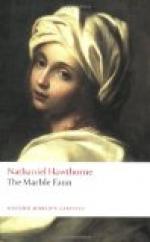“But he loves me,” repeated Miriam, in a low voice, to herself. “Yes; he loves me!”
It was strange to observe the womanly softness that came over her, as she admitted that comfort into her bosom. The cold, unnatural indifference of her manner, a kind of frozen passionateness which had shocked and chilled the sculptor, disappeared. She blushed, and turned away her eyes, knowing that there was more surprise and joy in their dewy glances than any man save one ought to detect there.
“In other respects,” she inquired at length, “is he much changed?”
“A wonderful process is going forward in Donatello’s mind,” answered the sculptor. “The germs of faculties that have heretofore slept are fast springing into activity. The world of thought is disclosing itself to his inward sight. He startles me, at times, with his perception of deep truths; and, quite as often, it must be owned, he compels me to smile by the intermixture of his former simplicity with a new intelligence. But he is bewildered with the revelations that each day brings. Out of his bitter agony, a soul and intellect, I could almost say, have been inspired into him.”
“Ah, I could help him here!” cried Miriam, clasping her hands. “And how sweet a toil to bend and adapt my whole nature to do him good! To instruct, to elevate, to enrich his mind with the wealth that would flow in upon me, had I such a motive for acquiring it! Who else can perform the task? Who else has the tender sympathy which he requires? Who else, save only me,—a woman, a sharer in the same dread secret, a partaker in one identical guilt,—could meet him on such terms of intimate equality as the case demands? With this object before me, I might feel a right to live! Without it, it is a shame for me to have lived so long.”
“I fully agree with you,” said Kenyon, “that your true place is by his side.”
“Surely it is,” replied Miriam. “If Donatello is entitled to aught on earth, it is to my complete self-sacrifice for his sake. It does not weaken his claim, methinks, that my only prospect of happiness a fearful word, however lies in the good that may accrue to him from our intercourse. But he rejects me! He will not listen to the whisper of his heart, telling him that she, most wretched, who beguiled him into evil, might guide him to a higher innocence than that from which he fell. How is this first great difficulty to be obviated?”
“It lies at your own option, Miriam, to do away the obstacle, at any moment,” remarked the sculptor. “It is but to ascend Donatello’s tower, and you will meet him there, under the eye of God.”
“I dare not,” answered Miriam. “No; I dare not!”
“Do you fear,” asked the sculptor, “the dread eye-witness whom I have named?”
“No; for, as far as I can see into that cloudy and inscrutable thing, my heart, it has none but pure motives,” replied Miriam. “But, my friend, you little know what a weak or what a strong creature a woman is! I fear not Heaven, in this case, at least, but—shall I confess it? I am greatly in dread of Donatello. Once he shuddered at my touch. If he shudder once again, or frown, I die!”




